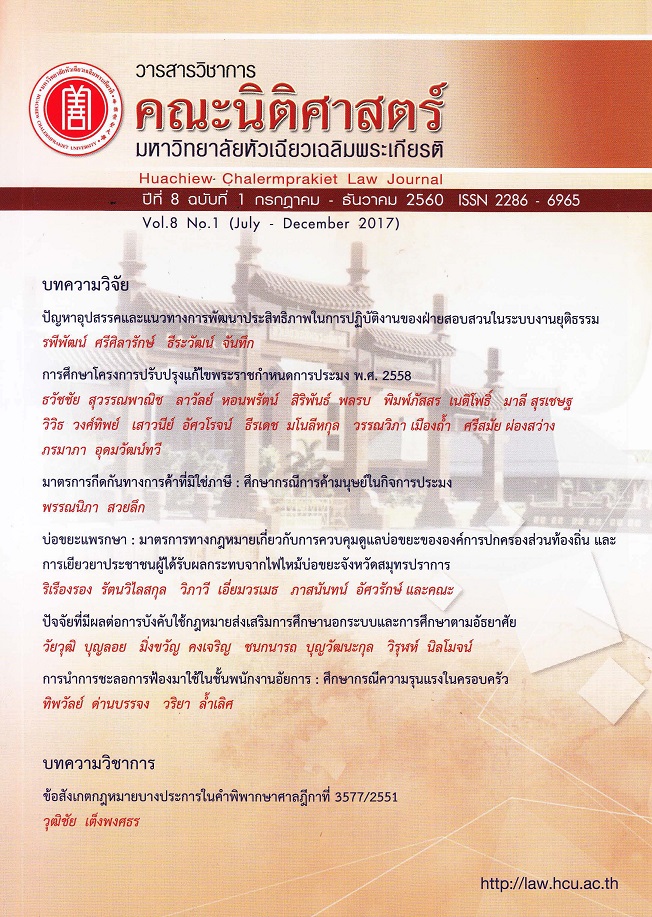ปัจจัยที่มีผลต่อการบังคับใช้กฎหมายส่งเสริมการศึกษา นอกระบบและการศึกษาตามอัธยาศัย
คำสำคัญ:
การศึกษานอกระบบ, การศึกษาตามอัธยาศัย, ปัจจัยที่มีผลต่อการบังคับใช้พระราชบัญญัติ ส่งเสริมการศึกษานอกระบบและการศึกษาตามอัธยาศัย, พ.ศ.2551บทคัดย่อ
บทความนี้เป็นส่วนหนึ่งของการวิจัยในระยะช่วงแรกจากหัวข้อวิจัยเรื่อง การศึกษาการบังคับใช้ พระราชบัญญัติส่งเสริมการศึกษานอกระบบและการศึกษาตามอัธยาศัย พ.ศ.2551 งานวิจัยมีจุดมุ่งหมาย 3 ประการคือ 1) เพื่อศึกษาสภาพ ปัญหาและอุปสรรคในการบังคับใช้พระราชบัญญัติส่งเสริมการศึกษา นอกระบบและการศึกษาตามอัธยาศัย พ.ศ. 2551 2) เพื่อวิเคราะห์ปัจจัยที่มีผลต่อการบังคับใช้ พระราชบัญญัติส่งเสริมการศึกษานอกระบบและการศึกษาตามอัธยาศัย พ.ศ.2551 และ 3) เพื่อจัดทำ ข้อเสนอแนะแนวทางการบังคับใช้พระราชบัญญัติฉบับนี้ให้มีประสิทธิภาพมากยิ่งขึ้น การดำเนินการวิจัย ประกอบด้วย 2 ขั้นตอน คือ 1) การสำรวจปัจจัยที่มีผลต่อการบังคับใช้พระราชบัญญัติส่งเสริมการศึกษา นอกระบบและการศึกษาตามอัธยาศัย พ.ศ.2551 และ 2) การตรวจสอบและให้ข้อเสนอแนะที่ได้จาก การศึกษาสภาพปัญหาและอุปสรรครวมถึงปัจจัยต่างๆ ที่มีผลต่อการบังคับใช้พระราชบัญญัติส่งเสริม การศึกษานอกระบบและการศึกษาตามอัธยาศัย พ.ศ.2551 นำผลที่ได้จากการสำรวจมาทำการวิเคราะห์ เพื่อให้ได้ประเด็นที่สำคัญสำหรับใช้เป็นข้อเสนอแนะแนวทางการบังคับใช้พระราชบัญญัติส่งเสริมการศึกษานอกระบบและการศึกษาตามอัธยาศัย พ.ศ.2551 กลุ่มตัวอย่างที่ใช้ศึกษาจากสำนักงานส่งเสริม การศึกษานอกระบบและการศึกษาตามอัธยาศัยกรุงเทพมหานครและจังหวัดเชียงใหม่ ขอนแก่น ระยอง นนทบุรี และสุราษฎร์ธานี และศูนย์การศึกษานอกระบบและการศึกษาตามอัธยาศัยเขต/อำเภอ ซึ่ง ความเป็นตัวแทนได้จากการใช้วิธีสุ่มตัวอย่างแบบหลายขั้นตอน (multi-stage sampling) ดำเนินการสุ่ม แบบแบ่งชั้นตามขนาดของสำนักงานส่งเสริมการศึกษานอกระบบและการศึกษาตามอัธยาศัยจังหวัด/ กรุงเทพมหานคร และใช้วิธีการสุ่มตัวอย่างแบบง่าย (simple random sampling) สำหรับเครื่องมือที่ใช้ ในการวิจัยคือ แบบสอบถาม แบบสัมภาษณ์และวิเคราะห์ข้อมูลโดยใช้วิธีการทางสถิติประกอบด้วย ค่าความถี่ ค่าร้อยละ ค่าเฉลี่ย (Mean) ค่าความเบี่ยงเบนมาตรฐาน (Standard Deviation) และการวิเคราะห์ เนื้อหา (Content Analysis)
ผลที่ได้จากการวิเคราะห์ปัจจัยที่มีผลต่อการบังคับใช้กฎหมายมีดังนี้ ในส่วนของการบังคับใช้ พระราชบัญญัติส่งเสริมการศึกษานอกระบบและการศึกษาตามอัธยาศัย พ.ศ.2551 มีประเด็นดังนี้ 1) การจัด การศึกษา 2) การบริหารจัดการการศึกษา 3) การมีส่วนร่วมของภาคีเครือข่าย 4) ความเสมอภาคและ ความเท่าเทียม 5) สิทธิในการรับการศึกษา 6) บทบาทและอำนาจหน้าที่ของคณะกรรมการ และ 7) บทบาทและอำนาจหน้าที่ของสำนักงาน กศน. สำหรับผลการบังคับใช้พระราชบัญญัติส่งเสริมการ ศึกษานอกระบบและการศึกษาตามอัธยาศัย พ.ศ.2551 มีขอบเขตดังนี้ 1) การมีส่วนร่วม 2) ความรู้และ ความเข้าใจในบทบัญญัติและการบังคับใช้กฎหมาย 3) การใช้กฎหมาย 4) ความเป็นอิสระและความ คล่องตัว 5) ความชัดเจนและความเหมาะสมของเนื้อหา สาระ และ 6) ระยะเวลาที่บังคับใช้และ การปรับปรุงแก้ไข
เอกสารอ้างอิง
กล้า สมตระกูล, ประมวลสาระชุดวิชา ปรัชญาและหลักการการศึกษานอกระบบและการศึกษาตามอัธยาศัย หน่วยที่ 8-15 (นนทบุรี: สำนักพิมพ์ มหาวิทยาลัยสุโขทัยธรรมาธิราช, 2554)
เจตน์ สถาวรศีลพร, “การบังคับใช้กฎหมายให้เกิดความยุติธรรมในสังคม : ข้อพิจารณาบางประการว่าด้วย กฎหมายกับการบังคับใช้ และความยุติธรรมกับสังคม” ใน คณะนิติศาสตร์ มหาวิทยาลัยธรรมศาสตร์ (บรรณาธิการ), รวมบทความที่ระลึกในโอกาสอายุครบ 60 ปี รองศาสตราจารย์สมยศ เชื้อไทย (กรุงเทพฯ: โรงพิมพ์เดือนตุลา, 2553)
ธีรพล อรุณะกสิกรและคณะ, รัฐธรรมนูญแห่งราชอาณาจักรไทย พุทธศักราช 2550 (กรุงเทพฯ: โรงพิมพ์เดือนตุลา, 2550)
นัฑ ผาสุกและคณะ, พระราชบัญญัติส่งเสริมการศึกษานอกระบบและการศึกษาตามอัธยาศัย พ.ศ. 2551 : พร้อมทั้งสรุปสาระสำคัญ ประวัติ ความเป็นมา กระบวนการ และขั้นตอนในการตราพระราชบัญญัติ (กรุงเทพฯ: สำนักการพิมพ์ สำนักงานเลขาธิการวุฒิสภา, 2553)
มูลนิธิสูข-แก้ว แก้วแดง, รายงานการศึกษาวิเคราะห์ศักยภาพและแนวทางในการส่งเสริมการศึกษาตลอดชีวิตสำหรับประชาชนของสำนักงาน กศน. เพื่อสนับสนุนการเข้าสู่ประชาคมอาเซียนของประเทศไทยในปี พ.ศ. 2558 (กรุงเทพ : สำนักงานส่งเสริมนอกระบบและการศึกษาตามอัธยาศัย, 2556)
ราชกิจจานุเบกษา, พระราชบัญญัติระเบียบบริหารราชการกระทรวงศึกษาธิการ พ.ศ. 2546 ราชกิจจานุเบกษา เล่มที่ 120 ตอนที่ 62 ก. (10 ตุลาคม 2556) ราชกิจจานุเบกษา <http://www.ratchakitcha.soc.go.th>.
ราชบัณฑิตยสถาน, พจนานุกรมศัพท์ศึกษาศาสตร์ (กรุงเทพฯ: อรุณการพิมพ์, 2555)
ราชกิจจานุเบกษา, รัฐธรรมนูญแห่งราชอาณาจักรไทย พุทธศักราช 2540 ราชกิจจานุเบกษา เล่ม 114 ตอนที่ 55 ก (23 พฤษภาคม 2558) ราชกิจจานุเบกษา <http://www.ratchakitcha.soc.go.th>.
วนิดา แสงสารพันธ์และคนอื่นๆ, โครงการศึกษากฎหมายเพื่อพัฒนาการศึกษาของชาติ (สถาบันวิจัยและให้คำปรึกษาแห่งมหาวิทยาลัยธรรมศาสตร์ มหาวิทยาลัยธรรมศาสตร์, 2551)
สกู๊ปแนวหน้า, บทเรียนจาก “บราซิลโมเดล” สู่ทางออก “ปฏิรูปการศึกษาไทย” หนังสือพิมพ์แนวหน้าฉบับวันพฤหัสบดี ที่ 12 ธันวาคม พ.ศ. 2556 (9 มิถุนายน 2557) แนวหน้า <http://www.naewna.com/scoop/81413>.
สนอง โลหิตวิเศษ, เอกสารปรับปรุงชุดวิชา 26301 การศึกษาตลอดชีวิตและการศึกษานอกระบบโครงร่างหน่วยที่ 9 กฎหมายและนโยบายที่เกี่ยวข้องกับการศึกษาตลอดชีวิตในต่างประเทศ (นนทบุรี: สำนักพิมพ์มหาวิทยาลัยสุโขทัยธรรมาธิราช, 2557)
สมยศ เชื้อไทย, คำอธิบาย วิชากฎหมายแพ่ง : หลักทั่วไป เล่ม 1 ความรู้กฎหมายทั่วไป (กรุงเทพฯ:บริษัทโรงพิมพ์เดือนตุลา จำกัด, พิมพ์ครั้งที่ 4, 2540)
สำนักงาน กศน, จำนวนนักศึกษาของสำนักงานส่งเสริมการศึกษานอกระบบและการศึกษาตามอัธยาศัย (1 มีนาคม 2559) ระบบสารสนเทศ สำนักงาน กศน. <http://203.172.142.230/mis-dashboard>.
สำนักงานคณะกรรมการกฤษฎีกา, เรื่องการตราพระราชกฤษฎีกาว่าด้วยการจัดตั้งสำนักบริหารงานการศึกษานอกโรงเรียน พ.ศ.2547 (29 มีนาคม 2559) <http: //61.19.241.70/rkj/uploadword/691240.doc>
สำนักงานคณะกรรมการพัฒนาการเศรษฐกิจและสังคมแห่งชาติ, แผนพัฒนาเศรษฐกิจและสังคมแห่งชาติ ฉบับที่ 11 พ.ศ.2555-2559 (14 กรกฎาคม 2555) สำนักงานคณะกรรมการพัฒนาการเศรษฐกิจและสังคมแห่งชาติ <www.nesdb.go.th/Default.aspx?2554>.
สำนักนิติการ สำนักงานปลัดกระทรวง กระทรวงศึกษาธิการ, รายงานการวิจัยการติดตามประเมินผลการบังคับใช้กฎหมายเกี่ยวกับคณะกรรมการสถานศึกษาขั้นพื้นฐาน 2551 (กรุงเทพฯ: โรงพิมพ์ชุมนุมสหกรณ์การเกษตรแห่งประเทศไทย จำกัด, 2551)
สุมาลี สังข์ศรี, การเรียนรู้ตลอดชีวิตสำหรับประเทศไทย (นนทบุรี: สำนักพิมพ์มหาวิทยาลัยสุโขทัยธรรมาธิราช, พิมพ์ครั้งที่ 2, 2556)
สุรพล นิติไกรพจน์และคณะ, รายงานการวิจัย เรื่องแนวทางและความเป็นไปได้ในการปรับเปลี่ยนภารกิจ บทบาท และอำนาจหน้าที่ของสำนักงานส่งเสริมการศึกษานอกระบบและการศึกษาตามอัธยาศัย (สำนักงาน กศน.) ให้สอดคล้องกับแนวคิดในเรื่อง การส่งเสริมการศึกษาตลอดชีวิต (กรุงเทพฯ: บริษัทนำทองการพิมพ์ จำกัด, 2556)
ดาวน์โหลด
เผยแพร่แล้ว
รูปแบบการอ้างอิง
ฉบับ
ประเภทบทความ
สัญญาอนุญาต
บทความหรือข้อความคิดเห็นใด ๆ ที่ปรากฏในวารสารฉบับนี้เป็นวรรณกรรมของผู้เขียนโดยเฉพาะ คณะนิติศาสตร์มหาวิทยาลัยหัวเฉียวเฉลิมพระเกียรติ และกองบรรณาธิการไม่มีส่วนรับผิดชอบหรือไม่จำเป็นต้องเห็นด้วยกับข้อคิดเห็นนั้น แต่ประการใด








